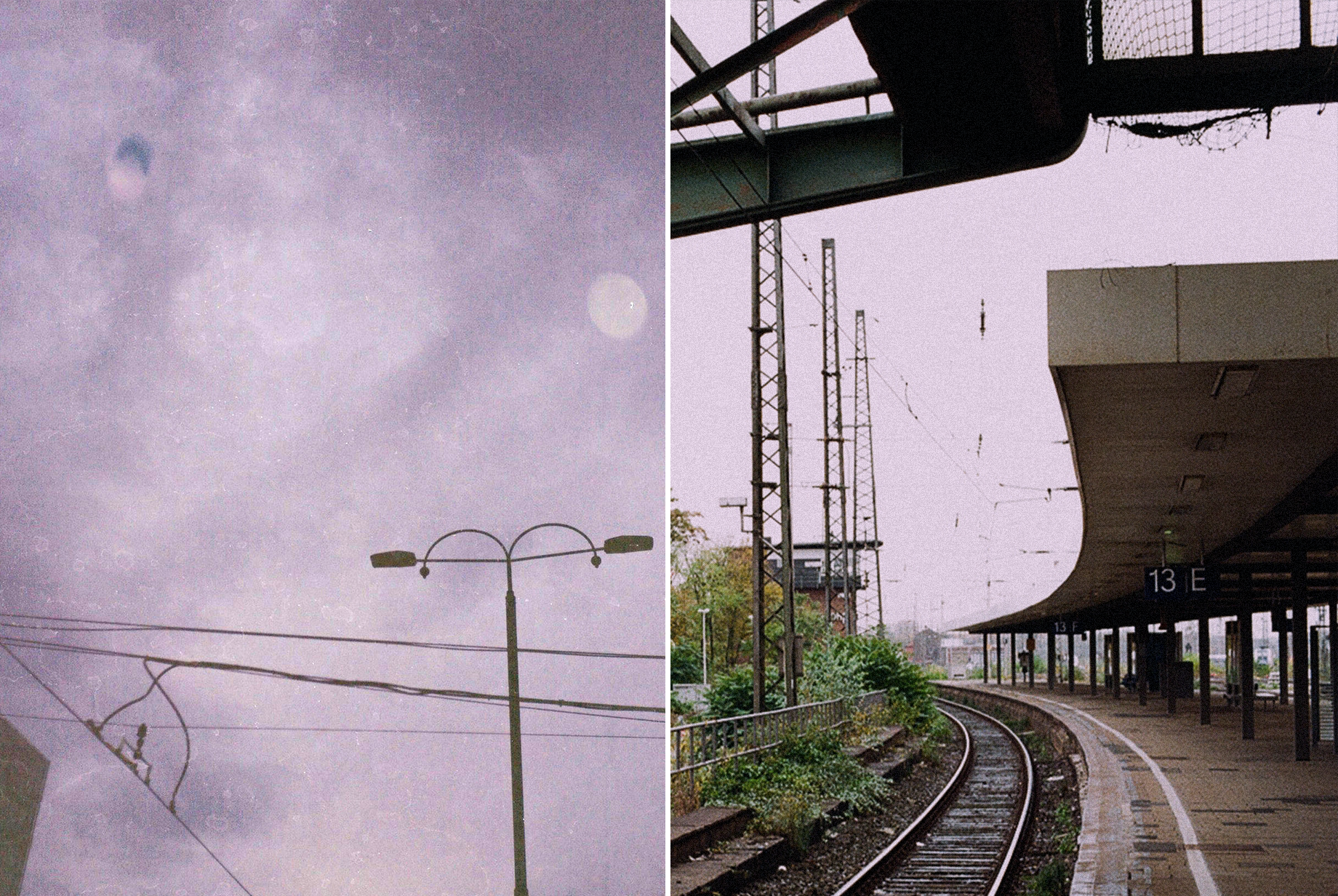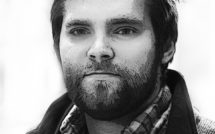

We’d already shown our passports at the border—it was still Czechoslovakia-Germany then. We’d kept the lights on in our compartment, waiting for the guard. Drab uniform. Angular face. Documents, he’d said. The Cold War was basically dead. Still, I could imagine.
After he left, we settled down to sleep. Past midnight now. The return leg stretched out long before us. Lori, my friend from Philly, chose one of the benches, while Franz, a (West) Berliner, settled on the other. I lay on the floor on our coats. Incessant vibrations. Click-click. Click-click. Like time asserting itself. We’d all just turned twenty that year.
A few days before, on the train into Prague, I’d read a Czech novel—for the lovers, not the philosophy, though I’d bought it to understand history. Franz and Lori had played cards absentmindedly, betting their chocolates, watching the landscape. Lori sat cross-legged, elbows on knees, jaw in her hand. Talk meandered. I on my father’s cousin from Mississippi who’d been a spy in Paraguay. Lori on her parents’ orchard out in the sticks. How to make cider. How to make jam. The great aunt who used to lead her down the rows of trees, calling her “tiny follower,” lifting her by the waist to reach the fruit.
Lori looked, not at me, but at Franz as she spoke, thumbing through cards, drumming her cheek with the pads of her fingers. Her face was pale and smooth and wide like a frog’s. I took candy from the betting pile. Don’t, Yancey, she said, lightly chiding. Franz showed off his glasses, new and round and wire-rimmed like John Lennon’s. Or like an old lady’s, I muttered. He passed them to Lori, brushing her wrist. The frames had left dents on the sides of his nose. Do they pinch you? I asked. No, he said. They hug.
Now the Prague-Berlin train ripped through the night like adrenaline through me. I couldn’t sleep. The record played: Love is for others. Life is for others.
~
Once arrived in the city, we’d dropped off our bags in our rooms and gone to the center by taxi. From the front seat, Franz had told us what to look at, as if he’d seen it all before. My mother has been here, he said, insisting. She’d given him a list.
We got out and came to a building. Inside was a photo exhibit—work by Josef Koudelka and his contemporaries. Pictures hung in a few blank rooms. A woman in one image kissed a man as a Soviet soldier looked on. She’d hiked her leg over her partner’s. A way to taunt the voyeur. Belittling the invader, saying, This one is more attractive than you.
Later, we crossed the Charles Bridge in the cold. Franz and Lori held hands, discussing the German occupation, what they’d read in books. I kept a little behind. Lori was heavy at the bottom, Franz as wiry as a teen, no butt to speak of. Lori had that. She looked like someone who’d easily have children.
Franz slowed and pivoted, bringing me into his story. Something about his father as a boy using grenades to blow up fish in the Danube. The bodies would float to the top, and the boy would collect them for food. Illegal, but the family was hungry. Three children and a mother post-war. They had to survive, Franz said, but I don’t mean that as an excuse.
Excuse for what? I prodded. He couldn’t say exactly, so I went further: Was he trying to acknowledge his family’s guilt? Repent in some indirect way? His father had been alive to blow up those fish. My father had been a boy in the Mississippi Delta when people were left hanging from trees.
Yes, was all Franz said. He’d turned back to Lori, but she was looking away—at two young nuns as they passed, heading toward the bank we’d just left. They wore veils on their heads and wool coats over their habits. Their arms were linked. The taller one leaned in to listen, maybe to a bit of gossip related by the other. A confidence. A secret.
Lori’s complexion in the chill seemed almost translucent. It’s us, she said to me, meaning the nuns. They’re sisters.
You’re sweet, I said. And clever. She’d steered us away from our subject.
She reached for my hand with her free one, and we were three. Below us, ice moved sluggishly down the Vltava.
~
I’d picked at Franz all along. Hair like curled straw. Bespectacled. Fair. Unbearably cheerful. A biology student. Spouting his facts. Stopping at bookshops to look at the work in translation. A little in English. Not much in German. He said he’d read this one and that one. Had I? Not yet, but I plan to, I said. As if I were one step ahead. Lori bought a novel he liked. She said she was keeping a list. Like Franz’s mother? I quipped. She didn’t reply. She’d started taking his arm. He seemed to dance as he walked. A wig on a pogo stick. Lori got on to me: Quit, Yancey. Please. Don’t mock all the time. It’s exhausting. She looked much as he did actually. Curls, though brunette. Glasses, though in tortoise. Not skipping along as he did—more ponderous. Taking forever. But silly too. In a long down coat. Like the Michelin man, I’d say. Cruelly I’d say.
~
Neither of them stirred now on their seats, their beds, in the cold train compartment, trundling through Germany back to Berlin. Winter pressed against me from beneath. Like the weight of a body against me. But air.
I’d not even wanted to go. Or, I had. I had. As a spy’s relation. No, more as a witness to the changes, the times. The wall down. Prague waking. The first trickle of tourists coming in. Unmarked cafés. A town where one had to pay a bribe, it seemed, at a restaurant. Though it was worse than I’d thought: A town with little food. I’d wanted to go—not to romanticize (I told myself) but to see. Only not as their third. I’d be uncomfortable, I’d said. Lori had pressed. She was nervous, she said. They were new at this, she said. Not any newer than you and me, I said. The three of us, all exchange students, had just met that fall.
It’s different, she continued, removing her glasses. Her eyes looked larger. Little frog, I called her. She and I were close. Like sisters, she said.
But you’ll want to be alone with Franz. I’ll feel awkward.
I won’t let you. Plus, you like each other. You discuss things—subjects.
We disagree about subjects. It’s you and Franz who discuss them.
Please, Yancey. I’ll be more relaxed with you there. I don’t want us to go alone yet.
Third wasn’t so bad, I’d decided. Like a child to parents. As if having a net. I was free but held. Could enter the love when I wanted, then leave it. Could access the open parts of these two, for they were opening in front of each other and thus before me. But not all the way.
~
We’d gone to the Old Jewish Cemetery. Brittle head of stone upon stone. Bone on bone. A mound inside the walls. Platform of loam. We entered as mourners. Lori’s generations were from Poland, and who knew where they lay now. So these were hers, she’d said, walking ahead, a pillar of down and corduroy and leather. Pushing through damp. Through a sea of upright, crooked books. Creating a wake in which Franz followed. They stood on a grave—all of it was grave. He whispered something in her ear, then kissed her, his hand on her face where she usually drummed. Descendants of oppressor and oppressed, exchanging caresses. I moved away.
Love is love, I’d read somewhere. It just changes shape to fill the container. Like air. Different kinds, but the “molecular structure” is the same, Franz might say.
Near evening we found a café—marked, operating—at the bottom of Castle Hill. I went to get seats while they waited in line. A blond man—Danish, fortyish—sat in a corner reading a book. The title on the cover was in English. I asked him, Are these places free? Yes, he said. Pity you aren’t alone. I’m not, I said. He slid me his glass of cognac. I haven’t touched it, he said. What will you do if I drink it? I said. He: I’ve already had one. I took the snifter and sipped. I could feel myself warming as he stared. I tightened my stomach and stood a bit taller. Moved my hair forward over my shoulder. Franz approached. I’ve found us three seats by the fire, he said. He smiled at the Dane. Then noticed the cognac.
Come, he said.
I followed.
~
Now on the train, I heard Lori turn over. A cough. Fingernails against scalp. The swish of movement. Her feet touched down at my side. Are you okay? I just need the loo. Your clogs are near my feet. She got there. Slid the compartment door open. A blast of air from the window in the hall. Cold but fresh. She pushed the door closed, sealing me in. Us in. Franz stirred on his bench. Are you awake? I said. No, he said.
Just a day ago—was it?—we’d lost Lori on Castle Hill. After the café, the three of us had started our climb. The trickle of tourists became a thicket. Up and up. Franz and I had argued. He’d liked Koudelka’s abstract pictures but not the exhibit’s documentary work.
Why? I said.
Imagination, he said.
You prefer imagination to truth?
Is what comes from imagination untrue?
That’s not what I meant, I said.
What did you mean?
I mean I find it interesting you so definitely prefer the abstract, as if you’d rather avoid the literal: escape, not look.
Would you say the entire Expressionist movement is trying not to look?
I think you’re trying not to look.
I’d say the Expressionists are looking in another way. That’s what I want to do. See beneath the surface.
Why does it have to be either-or? I said. The documentary work bears witness. Don’t you think that kind of seeing is important?
He wasn’t bouncing now. We’d stopped, in fact.
It’s a preference, Yancey. Why does it matter?
I’m wondering what you don’t want to see.
We stood close, jostled by the crowd. My reflection was outsized in his glasses.
It’s strange, Yancey, but I have this feeling you—
Then his face went whiter. He turned around. I realized it too. We didn’t have Lori. Night was coming on. Bodies went by. We studied the faces. She was nowhere among them. Just gone.
We headed back down the hill, pushing through people, calling her name. I ended up alone on one street. The government building abutting it was dark. I heard a window open. Saw a man step onto its balcony, his body in silhouette. I had a bad feeling and started to run.
Franz waited at the top. How could I have lost her? he said. Kept saying. We knew she had no money. The sun had gone down. We’d made no emergency plan. Could she have been taken, I wanted to ask but pushed the thought back.
The uniformed guards near the gate seemed bound by an oath of silence and wouldn’t engage us. I got in the face of one—pimply, adolescent—who looked stunned as I yelled: Please, help. Our friend is missing. He relented. Caught my eye. Tipped his head toward a door across the square. I turned to Franz. Come.
We entered an office, barely furnished, the walls tacked with posters of swimsuit models. Not good, I thought. Security men in neckties smoked and played cards. Franz spoke in German to one who raked his hair, acting as if he didn’t understand an occupier’s language (or so Franz conjectured). But after a minute, the man answered. Franz crossed his arms. His curls moved as he nodded. His jaw was set. He seemed different—a mystic, staring into a middle distance, as if he’d grasped some knowledge and gone inward.
~
Again the swish of our sliding compartment door. Again the blast of air. The sealing off. Lori stepped over me. Got back to her bench. The dining car is full of smokers, she whispered. I had to walk through it. Now I’m awake. Should we go read or something? I’m into that novel you brought.
I sat up, and Franz let his arm drape across the gap where I’d been lying. Please, he said, I need to sleep. Lori and I found shoes and coats and went out to the hall.
At a table in dining she pulled the contents from her pockets, playing as if she’d never seen them before. Ooh-ing and ahh-ing. Sweetly. As if she were performing to children. A Swiss army knife. Her deck of cards. An abstract drawing she’d torn from her notebook. Three truffle balls wrapped in plastic. A streamer of tissue. I moved the objects around on the table. Her drawing here. Army knife there. Another kind of game. Shuffling. A truffle sailed into the aisle. Slow down, Lori said. I didn’t. I pushed the tissue into her lap. Wanted to sweep it all to the floor. She reached across the table for my book.
Don’t read that now, I told her.
You’re on edge, she said.
Let’s play gin.
She picked up the box that the cards were in and fumbled with the top.
And you seem slow as molasses, I said.
What’s wrong with you, Yancey?
That’s my mother’s phrase. Slow as molasses.
That’s not what I asked.
I’m bored, I said.
You’re annoyed, she said. You have been. What is it?
I don’t know, I said.
Tell me why you’re upset.
I took the box from her, got it open, and dealt.
~
The card-playing security guards had sent Franz and me to the police. We’d run through a warren of dark, downhill streets. Those men don’t care about Lori, I said. We’re objects to them. Did you see those posters? Yes, he said, I did.
We found the station, a storefront situated on a block of vacant buildings and outfitted with what looked like a mixing board for a band. Cold War–era equipment, Franz offered, as if that era was ancient history. Don’t act so superior, I said. I imagined my father’s cousin in a photo we had of him, packing heat on a dirt road in Paraguay, and wondered what he’d countenanced or done. Franz went to the desk and explained, again, in German; the man here replied immediately. The station had only one car, he said. If we could wait, someone would drive it over and take us out to search.
Franz and I each used the WC, then we sat slumped in the dim waiting room. We smoked. (Franz kept a pack of Camels in his coat.) I finished my cigarette first. He held his low near the floor. A plume rose up. Smoke signal, I said, breathing it in, column of tobacco scent. Franz laughed, a sound that seemed to stop flat. In the dark picture window, his face looked as ashen as his hair. I too was pale. A wash of pallor. I put my hand out, and Franz took it. I kissed him long on the cheek, pressing to make a mark there. The way his glasses left a mark. He leaned his body into me. As if to absorb it: the moisture, the shape, the O. Like a word. We’ll find her, I whispered. Don’t worry. Though what did I know? I was twenty. He turned and his mouth brushed mine. Lips like insects’ wings: a light grazing, light flutter. Do you need help? I asked him. Yes, he said. Yes? Yes. Yes? He stamped out his Camel on the tile floor and left it. We stood and walked back to the WC. I didn’t let go of his hand.
~
The dining car was loud. The overhead lights were bright, and it could’ve been any hour. People got drunk. Lori and I each had a beer. We played several rounds of gin, though she didn’t try hard. She told me she might be in love with Franz.
But I can’t pin him down, she said. There’s a kind of block. He seems to stop short.
He cares for you, I said. He watches you in that way. I see him.
You’re kind, but sometimes I feel like his sister too.
I’m not kind, I said, and you’re more than his sister. He follows you around. He tends to you. You keep your hands on each other.
We’ve started talking about things—his background and mine.
How do you feel about that?
We’re trying to be sensitive. Talk to each other as individuals, not as emblems, if that makes sense. But also address the history. I realize I don’t mind our differences as much as I feared I might.
How far have you gotten in the book?
What? She paused. I knew she wasn’t finished about Franz, but then she answered me, acquiescing to the shift. About a third of the way, she said. Maybe half. Why?
I asked what she thought of the reference to Nietzsche and the concept of eternal return. I called it the doom of repetition. I don’t want to believe in it, I said. I know there are cycles in history, as you and Franz, I assume, have been discussing. But the individual has a life. We can make choices. We’re significant in ourselves—outside of any cycles, even if they exist.
Well, they do exist, Lori said. You see cycles in the Torah, for instance. In some of the Prophets. The people reject God. They suffer. God sends the rescue. They turn back to him. Then they get complacent and reject him. The same cycle. Maybe there’s something to it. Maybe we do return, keep returning, to the same things, as a human race.
Like a dog to its vomit, I said.
She took off her glasses and set them by our cards. Tortoise shell. Slow as molasses. We’d never be any closer than this. I’d made sure of it, hadn’t I? She’d feel it with me, too, eventually: a block.
Or to love, Yancey, she said. Couldn’t we say we return to that? What about the lovers—what you wanted from that book? Why should the notion of returning have to be so bleak?
How can you say that, given where we are?
I’m just seeing differently.
You sound like Franz. He says he’s avoiding looking at surfaces. He invoked the Expressionists.
It’s not avoidance. I’m making a choice, just as you said. If I live always waiting on the other shoe to drop, I’ll have a very unhappy life.
~
I couldn’t say what time we got back to the compartment. We took off our shoes in the hall. Our coats. Lori passed hers to me. Michelin mattress. I said that out loud. Shhh, she said. Franz is asleep. We got ourselves situated. Franz didn’t move. I lay there on the floor for a while. Click-click. Click-click.
The police car had finally arrived that night at the station. I rode in the back seat, Franz up front, his usual perch. The car like a roller skate. Doors thin as air. As the walls in the WC. We drove all over the town, Franz and the officer asking for Lori at the places we’d been. The café with the Dane. Some restaurant near the photo exhibit. The Charles Bridge, where we’d passed the nuns confiding. Franz and the officer: in and out of the car, the cold.
I waited as they made their forays. I envisioned the trees in Lori’s family orchard. Rows and rows. Sentinels. Out in the sticks. A chorus of little frogs. The child trailing behind the great aunt. Old lady, tiny follower. A line of oaks, branches misshapen, along a flooded field in the Delta. Flooded, winking eye. Then a dirt road through a wood and the pop of my father’s cousin’s boots on bracken. A lake full of blown-up fish. A boy on the shore, looking on. A surface of fins. Parts. Or were the fish whole? A surface of bellies.
In the end, we had nothing to go on. No information. No leads. Franz stared out the car window, talking in a mix of German and English. The driver, thin-necked, smoking one of the Camels, listened. He took us back out to the suburbs—back to the place where we’d rented our rooms. Escorted us up to the stoop.
As Franz opened the door, a shadow.
Lori was home.
We shouted. The officer told us to go have a drink (Franz translated the German into English—for Lori, not me). Then the man left, head bowed like a weight on a string.
~
I walked, Lori told us. What else could I do after I got lost? I had no money for the train. I did have a map, though. It took me hours. I actually enjoyed it. I saw people getting home to their flats. The spaces looked inviting through the windows and open doors. Children played in the street, waiting to be called for dinner. Or, I wanted to think so anyway. But what do families have to eat? One shop I passed had nothing on the shelves at all. Someone had drawn a smiley face on the empty window display. How do these parents manage it? Keeping the kids distracted—and healthy? It must be so difficult for them. I ended up playing hopscotch with a group of girls. One kept calling to me, Lorina! Lorina! We used a chunk of wood as the stone. We played a long time in the dark. But look.
She was lying on the couch with her feet, small balloons, propped up on the arm rest. She held her breath and blew her cheeks up. Franz clicked his tongue. They laughed. He touched her hair, moving a curl back from her forehead. His eyes softened. I imagined her hopping from square to square, holding her glasses so they’d stay on her face, her heavy bottom bouncing along with the children.
I got up and left them alone.
~
Now they were like two wigs on benches. Swaying above me with the sway of the train. The acrid smell of our breath in the cold. The rumble below. The window rattling as my insides did. Lori faced the wall. Her back hung off the seat a little. I couldn’t sleep. Could hear the clap of girls’ feet on the pavement. The chunk of wood landing in a square. Lori laughing. Lorina! A pillar encased in down, standing on graves. Franz’s hand on her luminous cheek. The two of them eyeing each other. The clap of our feet as we—Franz and I—ran down the hill to the station in the dark. As if the running were the rescue. What we could do. The feel of his face against my lips. The way he pressed back to get nearer. The brush of his mouth. The smell of tobacco from his plume signal. The cigarette butt abandoned as we rose. No. No, rather, his look of concern. The set jaw. Resolve. Presence. Some bit of knowledge I needed.
He was asleep now, I guessed. He lay turned toward the aisle. Toward me. I could hear his breathing, a ribbon of air. I reached up and felt for his arm. Grazed it. His sleeve. Found his loose fist on the bench. Slid my hand inside. He shifted and moved his away.

Photographic response by Merisa Bašić
Stacy Mattingly launched the Sarajevo Writers’ Workshop, a bilingual group of poets and prose writers in Bosnia and Herzegovina, in 2012. She later co-founded Narrative Collective in Atlanta, Georgia, with poet L.S. McKee. She has worked as a coauthor on books including, with Ashley Smith, the New York Times bestseller UNLIKELY ANGEL, an Atlanta hostage story released as a feature film, CAPTIVE. Stacy has taught creative writing at Boston University, where she received an MFA in fiction, and at GrubStreet, and she helped lead the first Narrative Witness exchange (Caracas-Sarajevo) for the University of Iowa’s International Writing Program. She has recently completed a first novel, set in the current-day Balkans.
Merisa Bašić was born and raised in Sarajevo, where she did a degree in graphic design at the Academy of Fine Arts. She holds a master’s degree in visual art and film and theatre production from the International University of Sarajevo. Merisa is a member of the Association of Fine and Applied Arts in Sarajevo and cofounder of the Association for Contemporary Art NAZOR. She has participated in various exhibitions and festivals, and she currently works as a digital and graphic designer and as a video producer.
Published on September 6, 2017.
Click here to read more on The Borders Project.




